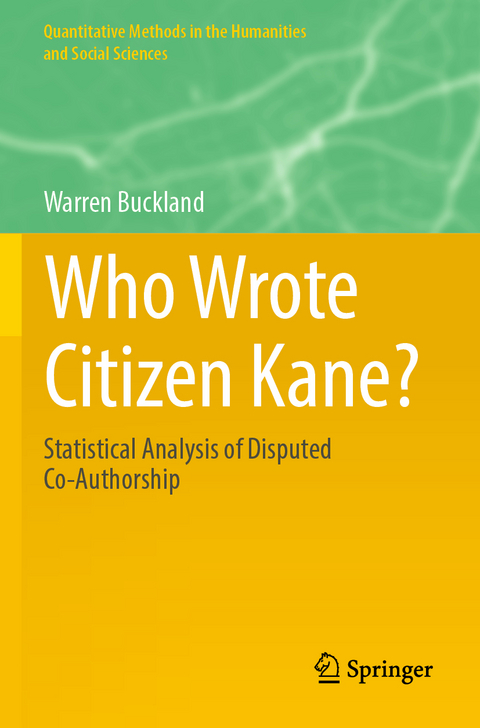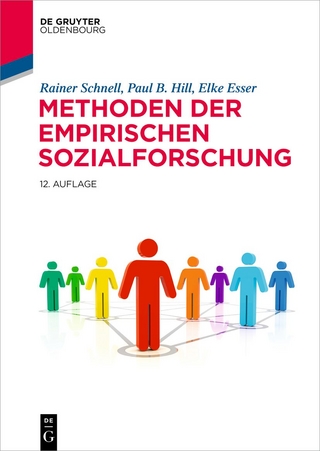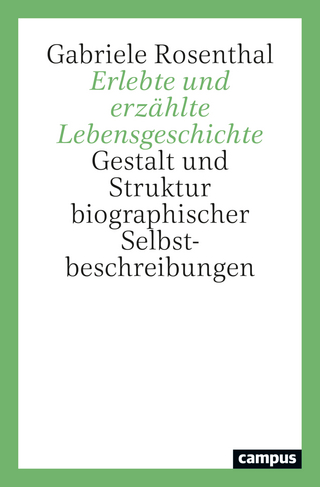
Who Wrote Citizen Kane?
Springer International Publishing (Verlag)
978-3-031-40226-5 (ISBN)
This book offers a solution to one of film history's major controversies: the long-running dispute over Orson Welles' and Herman J. Mankiewicz's contributions to the Citizen Kane screenplay. It establishes the vital importance of computing and statistics to solving previously intractable puzzles in the arts and humanities.
Citizen Kane (1941) is one of the most acclaimed films in the history of cinema. For 50 years it topped the Sight & Sound film critics' poll. Orson Welles directed the film and is credited with co-writing the screenplay with Herman J. Mankiewicz. But the co-writer credit generates furious disputes between those who argue Mankiewicz is the sole author of Citizen Kane and those who claim that Welles collaborated fully with its writing.
The author employs computing and statistics to answer two questions: What are the distinguishing features of Welles' and of Mankiewicz's writing?And What did each contribute to the writing of the Citizen Kane screenplay? To answer these questions, the author bypasses opinions and impressions, and instead subjects the language of the Citizen Kane screenplay to a 'forensic' examination.
Employing linguistics, basic statistical tests, plus computer technology and software, the author identifies the stylistic signature of each author - the combination of consistent and regular linguistic habits that make each author's writing distinctive. This book replaces impressionistic discussions of Mankiewicz's and Welles' contributions to the Citizen Kane screenplay with a rigorous, experiment-driven statistical analysis. Earlier statistical studies of authorship have discovered that small, unassuming language features (such as punctuation, pronouns, and prepositions) in statistically significant quantities, constitute a screenwriter's distinctive writing habits. Only with the extensive experimentation carried out in this volume, did the author decide Mankiewicz's and Welles' specific habits and their contributions to Citizen Kane.
Warren Buckland is Reader in Film Studies at Oxford Brookes University, UK. His research interests include (1) Film Theory (semiotics, cognitive film theory); (2) Narrative Theory (puzzle films, unreliable narration); (3) Digital Humanities (statistical style analysis, stylometric analysis of screenplays).
He is author of Narrative and Narration: Analyzing Cinematic Storytelling (2021), Wes Anderson's Symbolic Storyworld (2019), Film Theory: Rational Reconstructions (2012), Directed by Steven Spielberg (2006), and The Cognitive Semiotics of Film (2000). His edited collections include Puzzle Films: Complex Storytelling in Contemporary Cinema (2009).
Introduction: War of the Words.- 1. The Trials of Co.- Authorship.- 2. Screenplays: Words on a Page.- 3. The Statistical Analysis of Style: Aims and Methods.- 4. Distinguishing Mankiewicz from Welles: Training Phase Results.- 5. Comparing Mankiewicz and Welles to the Citizen Kane Screenplay.- (1): Relative Frequencies, Distinctiveness Ratios,and Confidence Intervals.- 6. Comparing Mankiewicz and Welles to the Citizen Kane Screenplay (2): Sentence Length, Clusters, Type/Token.- Ratios, and Linguistic Inquiry and Word Count (LIWC)In Conclusion.- Appendice.- Works Cited.- Index.
| Erscheinungsdatum | 01.10.2024 |
|---|---|
| Reihe/Serie | Quantitative Methods in the Humanities and Social Sciences |
| Zusatzinfo | XIII, 167 p. 68 illus. |
| Verlagsort | Cham |
| Sprache | englisch |
| Maße | 155 x 235 mm |
| Themenwelt | Sozialwissenschaften ► Soziologie ► Empirische Sozialforschung |
| Schlagworte | Citizen Kane • co-authorship • digital humanities • disputed authorship • Herman Mankiewicz • Orson Welles • stylometry |
| ISBN-10 | 3-031-40226-X / 303140226X |
| ISBN-13 | 978-3-031-40226-5 / 9783031402265 |
| Zustand | Neuware |
| Informationen gemäß Produktsicherheitsverordnung (GPSR) | |
| Haben Sie eine Frage zum Produkt? |
aus dem Bereich


